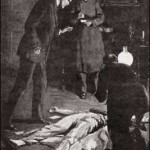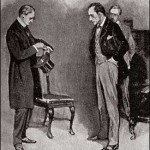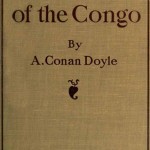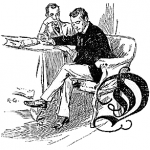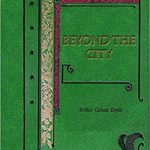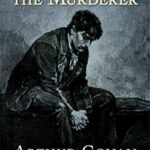Mr. Porlock Carr (counsel for the prosecution): In the meantime, my lord, we claim possession of this document, so that we may obtain expert evidence as to how far it is an imitation of the handwriting of the gentleman whom we still confidently assert to be deceased. I need not point out that the theory so unexpectedly sprung upon us may prove to be a very obvious device adopted by the friends of the prisoner in order to divert this inquiry. I would draw attention to the fact that the young lady must, according to her own account, have possessed this letter during the proceedings at the inquest and at the police-court. She desires us to believe that she permitted these to proceed, although she held in her pocket evidence which would at any moment have brought them to an end.
Mr. Humphrey. Can you explain this, Miss Morton?
Miss Morton: Dr. Lana desired his secret to be preserved.
Mr. Porlock Carr: Then why have you made this public?
Miss Morton: To save my brother.
A murmur of sympathy broke out in court, which was instantly suppressed by the Judge.
The Judge: Admitting this line of defence, it lies with you, Mr. Humphrey, to throw a light upon who this man is whose body has been recognized by so many friends and patients of Dr. Lana as being that of the doctor himself.
A Juryman: Has anyone up to now expressed any doubt about the matter?
Mr. Porlock Carr: Not to my knowledge.
Mr. Humphrey: We hope to make the matter clear.
The Judge: Then the court adjourns until tomorrow.
This new development of the case excited the utmost interest among the general public. Press comment was prevented by the fact that the trial was still undecided, but the question was everywhere argued as to how far there could be truth in Miss Morton’s declaration, and how far it might be a daring ruse for the purpose of saving her brother. The obvious dilemma in which the missing doctor stood was that if by any extraordinary chance he was not dead, then he must be held responsible for the death of this unknown man, who resembled him so exactly, and who was found in his study. This letter which Miss Morton refused to produce was possibly a confession of guilt, and she might find herself in the terrible position of only being able to save her brother from the gallows by the sacrifice of her former lover. The court next morning was crammed to overflowing, and a murmur of excitement passed over it when Mr. Humphrey was observed to enter in a state of emotion, which even his trained nerves could not conceal, and to confer with the opposing counsel. A few hurried words—words which left a look of amazement upon Mr. Porlock Carr’s face—passed between them, and then the counsel for the defence, addressing the Judge, announced that, with the consent of the prosecution, the young lady who had given evidence upon the sitting before would not be recalled.
The Judge: But you appear, Mr. Humphrey, to have left matters in a very unsatisfactory state.
Mr. Humphrey: Perhaps, my lord, my next witness may help to clear them up.
The Judge: Then call your next witness.
Mr. Humphrey: I call Dr. Aloysius Lana.
The learned counsel has made many telling remarks in his day, but he has certainly never produced such a sensation with so short a sentence. The court was simply stunned with amazement as the very man whose fate had been the subject of so much contention appeared bodily before them in the witness-box. Those among the spectators who had known him at Bishop’s Crossing saw him now, gaunt and thin, with deep lines of care upon his face. But in spite of his melancholy bearing and despondent expression, there were few who could say that they had ever seen a man of more distinguished presence. Bowing to the judge, he asked if he might be allowed to make a statement, and having been duly informed that whatever he said might be used against him, he bowed once more, and proceeded:
“My wish,” said he, “is to hold nothing back, but to tell with perfect frankness all that occurred upon the night of the 21st of June. Had I known that the innocent had suffered, and that so much trouble had been brought upon those whom I love best in the world, I should have come forward long ago; but there were reasons which prevented these things from coming to my ears. It was my desire that an unhappy man should vanish from the world which had known him, but I had not foreseen that others would be affected by my actions. Let me to the best of my ability repair the evil which I have done.
“To anyone who is acquainted with the history of the Argentine Republic the name of Lana is well known. My father, who came of the best blood of old Spain, filled all the highest offices of the State, and would have been President but for his death in the riots of San Juan. A brilliant career might have been open to my twin brother Ernest and myself had it not been for financial losses which made it necessary that we should earn our own living. I apologize, sir, if these details appear to be irrelevant, but they are a necessary introduction to that which is to follow.
“I had, as I have said, a twin brother named Ernest, whose resemblance to me was so great that even when we were together people could see no difference between us. Down to the smallest detail we were exactly the same. As we grew older this likeness became less marked because our expression was not the same, but with our features in repose the points of difference were very slight.
“It does not become me to say too much of one who is dead, the more so as he is my only brother, but I leave his character to those who knew him best. I will only say—for I HAVE to say it—that in my early manhood I conceived a horror of him, and that I had good reason for the aversion which filled me. My own reputation suffered from his actions, for our close resemblance caused me to be credited with many of them. Eventually, in a peculiarly disgraceful business, he contrived to throw the whole odium upon me in such a way that I was forced to leave the Argentine for ever, and to seek a career in Europe. The freedom from his hated presence more than compensated me for the loss of my native land. I had enough money to defray my medical studies at Glasgow, and I finally settled in practice at Bishop’s Crossing, in the firm conviction that in that remote Lancashire hamlet I should never hear of him again.

